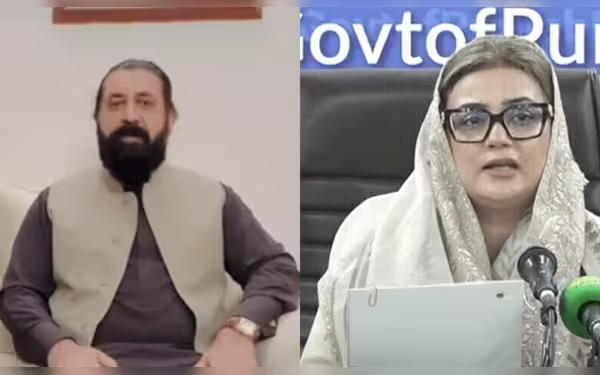Friday, October 4, 2024 12:29 PM
PTI and PML-N Clash Over Protests and Accusations
- PTI condemns government's crackdown on peaceful protests.
- PML-N accuses PTI of inciting violence and chaos.
- Political tensions raise concerns over democracy in Pakistan.
 Image Credits: dawn
Image Credits: dawnTensions escalate between PTI and PML-N over protests, accusations of violence, and concerns for democracy in Pakistan.
In recent days, Pakistan has witnessed a significant escalation in tensions between the Pakistan Tehreek-e-Insaf (PTI) party and the Pakistan Muslim League-Nawaz (PML-N) government. The backdrop of this conflict is rooted in widespread protests led by PTI against rising prices, allegations of electoral fraud, and demands for an independent judiciary. As the situation unfolds, both parties have engaged in a war of words, each accusing the other of undermining democracy and the rule of law.
As police forces intensified their crackdown on PTI leaders and supporters, the opposition party did not hold back in condemning what they termed the government’s "undemocratic" actions. PTI leaders, including Sheikh Waqas Akram, voiced their concerns during a press conference, emphasizing that the right to peaceful assembly is a fundamental human right. Akram stated, "Everyone can see what is being done to us in Rawalpindi and Lahore. It is our right to hold peaceful protests, and our founding chairman Imran Khan has always urged us to respect the law." This statement reflects the party's commitment to peaceful demonstrations, despite the government's attempts to suppress their activities.
PTI's planned protest in Liaquat Bagh was met with significant resistance, as law enforcement agencies reportedly sealed off all access routes and conducted raids on the homes of party members. Akram highlighted the use of excessive force by police, including baton charges and the deployment of expired tear gas shells, which resulted in injuries among protesters. He accused the government of deliberately creating chaos and instability, warning that they would be held accountable for any resulting unrest.
On the other side of the political spectrum, PML-N leaders, including Information Minister Azma Bokhari, have countered these claims by accusing PTI of inciting violence and attempting to disrupt national events, such as the Shanghai Cooperation Organisation conference. Bokhari alleged that PTI has trained youth to create petrol bombs, framing the party as a "terrorist group" intent on sabotaging peace in the country. She further questioned the motives behind PTI's protests, suggesting that they are merely a cover for seeking political concessions.
The exchange of accusations continued as PML-N Senator Talal Chaudhry labeled the PTI protests as a "gang of rioters seeking an NRO" (National Reconciliation Ordinance), asserting that such actions threaten the stability of the nation. He criticized the KP Chief Minister for failing to address the needs of his constituents, instead engaging in corruption and political theatrics.
This ongoing conflict raises important questions about the state of democracy in Pakistan. As both parties trade barbs, the citizens of Pakistan are left to navigate the complexities of political unrest and the implications it has on their daily lives. The right to protest is a cornerstone of democratic societies, yet the manner in which these protests are conducted and responded to can significantly impact public perception and trust in government institutions.
The current standoff between PTI and PML-N serves as a reminder of the fragile nature of political discourse in Pakistan. As both sides continue to clash, it is crucial for the government to uphold the principles of democracy and ensure that citizens can express their grievances peacefully. The path forward will require dialogue, understanding, and a commitment to addressing the underlying issues that have led to this unrest. Only through constructive engagement can Pakistan hope to foster a more stable and democratic future.













